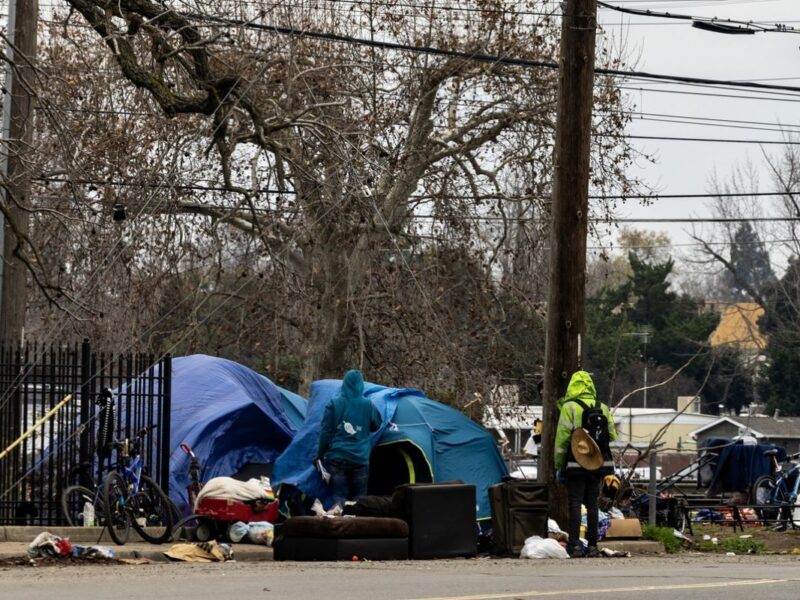Soaring rental prices across the country are increasing the likelihood of a significant spike in homelessness next year.
According to real estate data from Zillow, the U.S. average price for a single rental unit climbed to $1,824 in September, representing a nine percent year-over-year increase. States with high concentrations of homelessness like California, New York, and Florida are leading the way.
Research from the University of Southern California’s Lusk Center for Real Estate paints a stark picture of how this trend will impact the state. The center’s 2021 Spring Multifamily Forecast estimates that by 2023, rents will increase by $252 in Los Angeles County, $410 in Orange County, $348 in San Diego County, $310 in Ventura County, and $241 in the Inland Empire.
The report says areas with low vacancy rates, such as Rancho Cucamonga, Oxnard, and North City, could see triple-digit increases.
Richard Green, director of the USC Lusk Center, said the state’s job market is the critical component that will determine the future health of its rental market. The forecast showed that California was experiencing a net outward migration of people making $50,000 or less per year, meaning the state’s job market isn’t supplying wages that meet its increasing cost of living.
“Suffice to say that there are still a lot of people, in fact, more people who are well behind on their rent,” Green said.
Data from the latest Household Pulse Survey shows that the number of people across the country who are facing housing insecurity is growing. According to the Week 39 survey, more than 8.3 million individuals reported owing back rent. That is an increase of more than 300,000 individuals over four weeks.
Meanwhile, more than 6.3 million individuals report being “not confident at all” in their ability to make next month’s rent payment during Week 39 compared to 5.7 million individuals a month prior. Similarly, 1.4 million households now say they are “very likely” to be evicted within the next two months, an increase of 200,000 individuals over four weeks.
And the impacts of the nationwide rent increases are not impacting households equally. Another report from Zillow found that the rent increases are squeezing Black and Latinx renters the most. The report found that Black and Latinx households spend an average of 34% and 32% of their monthly income on housing, respectively, compared to 28% for whites and 26% for Asian-Pacific Islanders.
In total, Zillow found that this causes Black households to have an average of $920 less per month than white households. For Black families in San Diego, Sacramento, and San Francisco, the situation can be even more dire. In some cases, Zillow found these households spend an average of 53% of their monthly income on housing expenses.
The correlation between increasing rent and homelessness is not a theoretical one either. According to a study by the Government Accountability Office from July 2020, a federal watchdog agency, a median increase of $100 in rent can cause a nine percent increase in homelessness.
If these figures are born out in California, cities like San Francisco would add 750 more homeless people to its roster while San Jose adds 555 individuals and San Diego adds 374 people.
“The U.S. is one of the richest, wealthiest, countries in the world, and it is shameful that so many across the nation, including in my city of Los Angeles, are living on the streets,” Rep. Maxine Waters, D-CA, who commissioned the GAO report, said in a statement at the time. “The truth is that homelessness is a symptom of bigger problems, like America’s rental housing crisis, that for too long have gone unaddressed.”
State and local agencies have worked to prevent an increase in homelessness by launching rental and utility payment assistance programs and enacting eviction moratoriums. According to a study by Princeton University’s Eviction Lab, these policies prevented more than 1.5 million evictions and may have caused at least 11% fewer COVID-19 deaths during the pandemic.
However, property management and real estate interests have been consistently attacking these programs in the courts. They successfully overturned the federal eviction moratorium at the end of August and have since turned their attention toward ending unemployment insurance and rental assistance payments at the local level.
The National Equity Atlas found that the total rent debt nationwide is approximately $15 billion, with most renters being at least two months in arrears. And the vast majority of those behind on rent are low-income renters who lost their job during the pandemic.
“In the United States, renters have little housing security, paltry savings, and few legal protections from exorbitant rent increases or eviction (outside of a few states and cities with strong tenant movements),” one NEA report says. “The rent debt crisis adds another layer to these preexisting inequities.”
How You Can Help
The pandemic proved that we need to rethink housing in the U.S. It also showed that aid programs work when agencies and service organizations are provided with sufficient funds and clear guidance on spending aid dollars.
Contact your local officials and representatives. Tell them you support keeping many of the pandemic-related aid programs in place for future use. They have proven effective at keeping people housed, which is the first step to ending homelessness once and for all.













